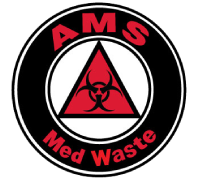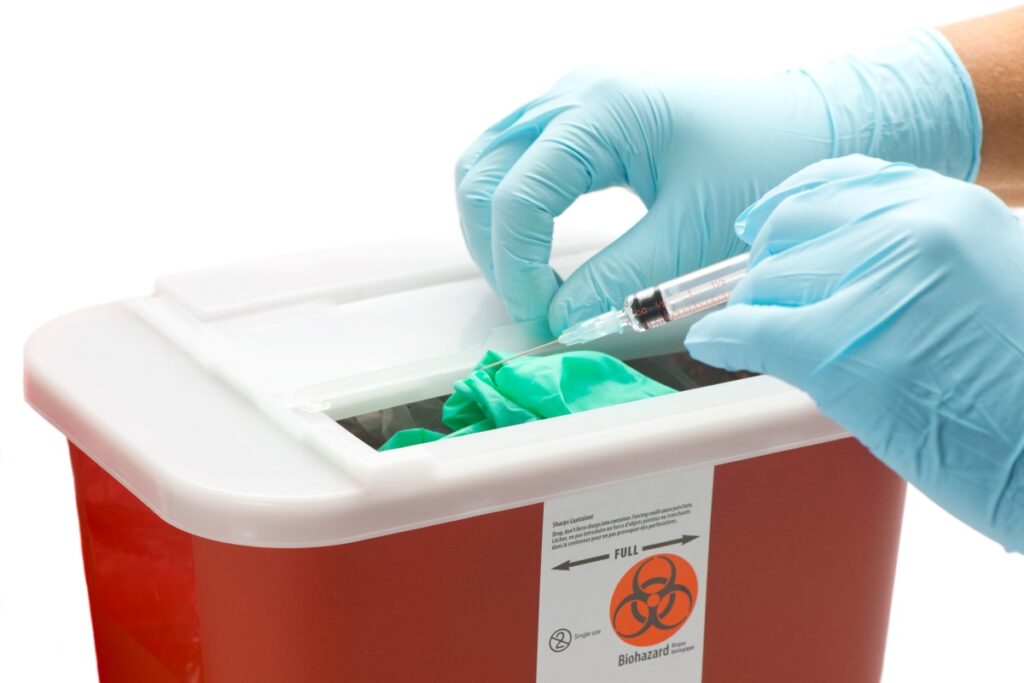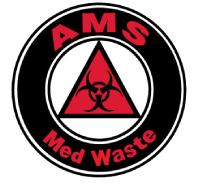As a healthcare facility manager, you wear many hats. From ensuring patient well-being to overseeing daily operations, your focus is unwavering. However, one aspect never takes a backseat: patient and staff safety. Medical waste disposal is a cornerstone of this commitment. Choosing the right containers forms the foundation of a safe, efficient, and compliant system.
At AMS Med Waste, your partner in safe and compliant medical waste disposal, we understand the complexities of managing healthcare facility waste. Choosing the wrong container can pose serious risks, including sharps injuries, spills, and regulatory non-compliance. This article equips you with the knowledge to make informed decisions about medical waste containers for your facility.
Why Container Choice Matters:
A recent study by the Centers for Disease Control and Prevention (CDC) reports that approximately 385,000 healthcare workers in the United States experience sharps injuries involving needles or other sharp instruments each year. Proper medical waste container selection plays a vital role in preventing these injuries and ensuring the safe containment of potentially infectious materials.
Essential Considerations for Safe Medical Waste Containers:
- Material and Durability: Select containers constructed from sturdy, puncture-resistant plastic to ensure long-lasting use and minimize the risk of rips or tears. Consider the weight and size of the waste you’ll be storing when choosing a container’s material thickness.
- Leakproof Design: Opt for containers with secure closures and leakproof seals to prevent spills and leaks. Look for features like snap-lock lids, twist-lock mechanisms, or gaskets for added security. Spills can pose a serious safety hazard and increase the risk of contamination.
- Biohazard Labeling: Clear and visible biohazard labeling is a legal requirement. Ensure the containers you choose prominently display the universal biohazard symbol and any additional information mandated by regulations in your area.
- Matching Container to Waste Type: Different waste types require specific containers.
- General medical waste: Look for containers suitable for solid waste like dressings, bandages, and casts.
- Sharps waste: Use puncture-resistant sharps containers with a single port to minimize the risk of needlestick injuries. Choose DOT-approved containers if your facility generates regulated sharps waste.
- Trace chemotherapy, pharmaceuticals, and hazardous materials: Consult with a medical waste disposal company to determine the appropriate containers for these specialized waste streams.
- Capacity and Pick-Up Frequency: Consider your waste generation volume and choose containers in appropriate sizes. Regularly evaluate how often your containers need to be emptied and establish a pick-up schedule that aligns with your waste production to prevent overflowing containers.
By focusing on these essential considerations, healthcare facility managers can select medical waste containers that prioritize safety, compliance, and efficiency.
Understanding Relevant Regulations and Container Selection
Medical waste disposal is heavily regulated to ensure public health and environmental safety. Here’s a breakdown of the key regulatory bodies involved:
State Regulations:
- Nearly all states have enacted medical waste regulations, but these can vary significantly.
- Some states base their regulations on the now-expired Medical Waste Tracking Act (MWTA), while others have developed their own unique standards.
- The agency responsible for developing and enforcing these regulations typically falls under the state’s Environmental Protection Agency (EPA) or Department of Health. In some cases, both agencies may be involved, with each overseeing different aspects of waste management.
- State regulations may cover various aspects including:
- Packaging, storage, and transportation of medical waste
- Registration and permitting requirements for healthcare facilities generating medical waste
- Contingency plans for managing unexpected waste situations
- On-site treatment options for certain waste types
- Employee training on proper waste handling procedures
- Waste tracking, recordkeeping, and reporting requirements
Federal Regulations:
While federal regulations don’t directly mandate container selection, they play a role in the overall medical waste management landscape:
- Occupational Safety and Health Administration (OSHA): OSHA regulations focus on protecting healthcare workers from bloodborne pathogens. These standards include requirements for sharps containers, medical waste container labeling, and employee training.
- Department of Transportation (DOT): Regulated medical waste is classified as a hazardous material under DOT regulations. These rules primarily apply to transporters rather than healthcare facilities, but it’s important to be aware of them due to potential liabilities associated with shipping waste off-site.
- Environmental Protection Agency (EPA): Although EPA no longer plays a central role in medical waste management, it does have regulations governing emissions from medical waste incinerators and specific requirements for certain medical waste treatment technologies under the Federal Insecticide, Fungicide, and Rodenticide Act (FIFRA).
- Centers for Disease Control and Prevention (CDC): The CDC issues guidelines for infection control practices, which can indirectly impact medical waste handling procedures.
Understanding these regulations is crucial for ensuring the safe and compliant management of medical waste. For specific details on regulations in your state, you can visit your state’s environmental protection agency’s website using this link.
Partnering with AMS Med Waste for Your Medical Waste Disposal Needs:
At AMS Med Waste, we offer a comprehensive selection of medical waste containers to meet the diverse needs of healthcare facilities. Our expert team can assess your specific requirements and recommend the most suitable container types and sizes for your facility. Here’s what sets us apart:
- Variety of Container Solutions: We offer reusable and disposable containers, sharps containers (DOT-approved and non-DOT approved), and specialized containers for trace chemotherapy waste, pharmaceuticals, and hazardous materials.
- Customized Pick-Up Schedules: We tailor pick-up schedules to your waste generation rate for optimal efficiency.
- Trained and Certified Technicians: Our team ensures safe and compliant waste collection.
- Regulatory Compliance Training: We offer training to help your facility stay up-to-date on regulations.
- Exceptional Customer Service: We’re here to address your questions and concerns.
Selecting the right medical waste containers is a crucial step in protecting your staff, patients, and the environment. By following these essential considerations and partnering with a reliable medical waste disposal company like AMS Med Waste, you can ensure the safe and compliant management of your healthcare facility’s medical waste.
Contact AMS Med Waste today for a free consultation on your medical waste disposal needs. Our experts can help you select the right containers and create a customized plan to ensure your facility remains compliant and safe.






